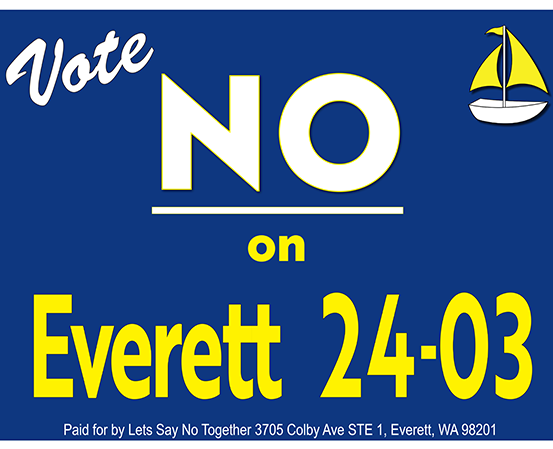What’s
Wrong
with
EVERETT
INITIATIVE
NO. 24-03?
Top 5 Problems
- No New Standards or Enforcement: The initiative claims to promote watershed cleanup, but it creates no new standards to be enforced nor gives the city any new resources to enforce existing laws.
- Only Encourages Lawsuits: It’s sole purpose is to promote litigation by private parties, potentially leading to lawsuits against any activity within the City of Everett.
- Undefined Violations: The initiative doesn’t clearly identify what constitutes a violation of the river’s rights, leaving it open to interpretation.
- Lower Burden of Proof: It reduces the burden of proof for lawsuits, not requiring strong scientific evidence.
- Unfunded City Obligations: The city would have to manage court-ordered judgments to restore the river without funds to cover the expenses, possibly leading to new liabilities.
Why It Won’t Work
- Broad Litigation Scope: The initiative’s vague language could lead to expansive litigation, potentially affecting land use practices and conflicting with state laws like RCW 36.70B, RCW 36.70A, etc.
- Conflicts with Existing Laws: The initiative is likely to conflict with the Clean Water Act, Shorelines Act, State Environmental Policy Act and other state and federal laws which already provide for enforcement, legal challenges, and citizen lawsuits. These conflicts with current regulations would lead to years of costly litigation. At who’s expense?
- City’s Administrative Burden: The initiative would require city departments to manage a complex, post-litigation restoration projects without assurance the city is fully compensation for their administrative and legal expenses.
- Ambiguous Enforcement: The initiative lacks clarity on how enforcement would be carried out, potentially escalating costs and creating future city liabilities.
Potential Impacts
- Litigation Could Stop Everything: Since the initiative defines the Snohomish River Watershed as including the entire City of Everett, the litigation this seeks can be used to stop infrastructure improvements, restrict public access to recreation, disallow the Port’s waterfront redevelopment, push employers like Boeing to leave, and discourage housing during an affordability crisis.
- Burdens a Strained Courts System. Allowing for frivolous lawsuits against so-called “violators” of the rights of watershed has the potential to court resources needed to prosecute real violators and offenders that threaten public safety.
- City’s Budget Impacts: The city’s potential exposure to litigation costs, restoration projects, and other new liabilities is high. And the City could itself be sued. These costs would further impact a strained city budget and may lead to higher taxes.
- Public Services Interrupted: The initiative could be used to disrupt public services like sewer treatment and even the city’s use of Lake Chaplain for its water supply. That wouldn’t just affect Everett, but most of Snohomish County.
Don’t Be Misled
- This Lacks Broad “Local” Support. The activist backers of this initiative took advantage Everett’s low threshold for signatures to put a measure on the ballot. They needed less than 1,000 signatures in a city of 111,000+ people.
LETS SAY NO TOGETHER PAC is a political action committee (PAC) set up in the State of Washington and subject to the rules and disclose requirements of Washington’s Public Disclosure Commission (PDC).
For a list of the Top Five Contributors to LETS SAY NO TOGETHER PAC click here.
This website is made possible by an in-kind contribution from Toyer Strategic Advisors, Inc.
